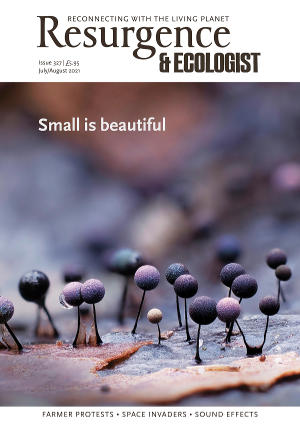For readers old enough to remember The Good Life, a 1970s sitcom about a middle-class couple who decide to embrace self-sufficiency in the wilds of suburban Surrey, this new memoir by Rebecca Schiller might have a ring of familiarity about it. On the surface, Earthed is a story of a middle-class couple and their children who move from town to a smallholding in the Kent countryside in search of a more authentic existence, living closer to the land.
Dig a little deeper, and any similarity to Tom and Barbara Good’s fictional life ends, as it soon becomes apparent that all is not paradise in the Garden of England. As well as battling with her overgrown Wealden plot, Schiller is struggling with her impending mental health crisis – one that looms ever larger as the challenge of turning her rundown garden into a productive smallholding while keeping her family happy is much harder than she anticipated.
Written over the course of a calendar year, and in the format of a confessional diary, Earthed relates Schiller’s attempts to coax her two-acre plot back to fecundity while trying to cope with marital problems and her frightening, undiagnosed condition. As the year progresses, she searches for solace in growing food and tending her animals, and trying to make sense of what is happening inside her mind and in her increasingly stressful reality.
It is when researching the history (mostly written by men) of her village and the surrounding countryside that she comes across the story of a 17th-century farmer’s wife, Joane Newman, a spirited character who apparently outlived three husbands and owned a large chunk of land where the author now lives. This discovery takes Schiller on a quest to unearth the lives of other women who have tilled the soil before her, inhabiting their lives through her imagination, meanwhile delving into the history of the smallholding movement in Britain.
Earthed is the latest in the current trend for ‘Nature cure’ memoirs that began in 2005 with Richard Mabey’s book of that name, where Nature is sought – and usually found – as a remedy for a variety of emotional crises, ailments and conditions, and includes such titles as Helen Macdonald’s H is for Hawk (bereavement), Amy Liptrot’s The Outrun (alcoholism) and Dara McAnulty’s Diary of a Young Naturalist (autism), each of which was awarded a top literary prize for its year of publication.
Where this book diverges from these titles is in its particular focus on female mental health. Just as the stories of Newman and other women working on (or writing about) the land are largely forgotten, women’s mental illness is often neglected, chronically underdiagnosed by a medical profession whose research on and understanding of mental disorders is often skewed towards men.
Entwining strands of memoir, fiction, history and gardening, Earthed is outwardly a journey through a year of a Kentish plot, but it’s also an inward journey through an unravelling mind. Schiller’s account of her breakdown is eloquent, her descriptions of wildlife and Nature are finely observed, and she writes with tenderness about her husband, her children and the menagerie of animals who share her home.
The final part of the book was written in the spring and summer of 2020, a year that brought the Australian bushfires, coronavirus and, at last, a diagnosis for Schiller’s condition. In the face of the climate emergency, a pandemic and a mental health crisis, pursuing the good life has never seemed more desirable – or more important.







